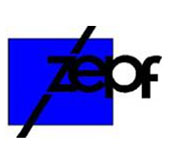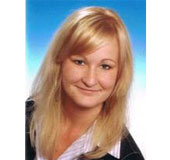"I Am Not Scared" Project
Homepage > Members > Project Partners > Partner Profile
Project Partners
| Name of the organisation: | Zentrum für empirische pädagogische Forschung (zepf), Universität Koblenz-Landau (Centre for Educational Research, University of Koblenz-Landau) |
 |
| Address: | Bürgerstraße 23, 76829 Landau, Germany | |
| Tel: | +49 (0)6341 280 32 191 | |
| Fax: | +49 (0)6341 280 32 166 | |
| Web site: | www.zepf.uni-landau.de |
| Name of the contact person: | Claudia Stelter |  |
| Function: | Research assistent | |
| Address: | Bürgerstraße 23, 76829 Landau, Germany | |
| Tel: | +49 (0)6341 280 32 191 | |
| Fax: | +49 (0)6341 280 32 166 | |
| E-mail: | [email protected] |
| Type of organisation: |
|
| Fields of action: |
|
| DESCRIPTION OF THE ORGANISATION |
The zepf is the major research institute of the University of Koblenz-Landau, currently employing 30 researchers involved in basic-oriented as well as application-oriented research.
The zepf is divided in four Centres of Excellence: Education The centre of excellence ‘Education’ focuses on systematic research on education and educational structures with the overall objective of diagnosis, evaluation or specification in order to identify new educational structures or to clarify existing ones. Another aspect which also belongs to this excellence centre is the development of instruments for controlling and prognosis of treatments. The subjects' contents are related to institutions and other educational structures. Moreover, they refer to objectives of education - the level of content, the societal anchorage and the impacts on the addressees. Furthermore, the organisation of education is considered with regard to education, further education and remedial courses. Teaching and learning The centre of excellence ‘Education’ deals with the following questions:
These and other questions are answered in basic and applied studies. Thereby, evaluations essentially contribute to the optimisation of teaching and learning processes in practical contexts. Advancement and development The centre of excellence Advancement and Development mainly focuses on diagnosis of individuals and organisations. With reference to individuals diagnoses, for instance, concentrate on social abilities of kindergarten children, pupils and employees in companies. In organisations, one of the main issues is, for example, the acquisition of actual and desired values concerning employees' professional and social competencies with regard to improved human resources development. On the organisational level diagnoses for subareas of companies and their co-operation between each other are compiled. For example, surveys are used to acquire work satisfaction or the organisation of interfaces between several departments. In order to carry out diagnoses of individuals and organisations, the excellence centre designs diagnostic instruments used in enterprises, schools, training centres and institutions for further trainings. Partially, these instruments are embedded in specially designed developmental concepts and are evaluated with regard to their acceptance and effectiveness. Furthermore, basic research projects are dealing with descriptions of individual or system development processes and underlying conditions. Health and well-being The tasks of the centre of excellence Health and Well-being are divided into the following disciplines:
The focus lies on:
Therefore, diagnostic instruments are developed and additionally examined with regard to their methodical and practical-oriented quality. The excellence centre moreover offers further trainings and programs for persons working in health services. All Centres of Excellence build on the following competence and expertise:
The Centre for Educational Research is engaged in national and international scientific research projects with ordering parties such as business companies, ministries and non-profit organisations. |
| EXPERIENCE IN PREVIOUS PROJECTS |
The zepf has been involved in several European and national projects related to school bullying and violence both as a coordinating institution and as a partner.
Starting in January 2011, the zepf coordinates the Comenius project “ABV4Kids – the virtual Anti-Violence-Village for Kids”. The ABV4Kids project aims to establishing a virtual village on school bullying and violence, racism and xenophobia within OpenSim a 3D virtual learning environment (3D VLE). Having started in December 2010, the zepf coordinates the Grundtvig project “CyberTraining-4-Parents - Cyberbullying and e-Literacy Training Courses for Adult Educators working with Parents”. The project aims at providing in-service training courses on cyberbullying for adult educators working with parents. The course will convey a basic understanding of new information and communication technologies and Internet safety. Furthermore, it will introduce to the topic of cyberbullying, its sources, prevalence and effects, legal issues related to cyberbullying on a national and transnational level as well as strategies for the prevention of cyberbullying. From 2008 to 2010 the zepf coordinated the Leonardo da Vinci project “CyberTraining – A European Training Manual on Cyberbullying” (http://www.cybertraining-project.org). The CyberTraining project aimed at providing a well-grounded, research-based training manual on cyberbullying for trainers that was made available in form of an eBook (http://www.cybertraining-project.org/book). From 2008 to 2011 the zepf has coordinated the Grundtvig project “AVC@SL - the virtual Anti-Bullying-Campus in Second Life” (http://www.antiviolencecampus.org). The AVC@SL project aims at establishing a virtual Anti-Violence-Campus (AVC) in the virtual environment of Second Life. The project targets adult education providers as well as adult learners dealing with the overall topic of school bullying, violence, racism and xenophobia. From 2001-2003 the zepf co-ordinated the Socrates/Minerva project “VISIONARY” (http://www.violence-in-school.info). The aim of the project was the construction of an International Internet-portal on violence prevention in schools. From 2004 to 2006, the zepf also coordinated the Socrates/Minerva project “VISIONARIES-NET” (http://bullying-in-school.info/en/content/forum-conferences/online-conferences.html). The VISIONARIES-NET project held online conferences with experts and practitioners dealing with the topic of school bullying and violence. From 2006 to 2008 the zepf was involved in the Socrates/Minerva project “aVataR@School” (http://www.avataratschool.eu). The project aimed to establish virtual role plays in which pupils, teachers and others try out strategies for conflict resolution by means of the School Peer Mediation approach. Also, from 2006 to 2008 the zepf was involved in the Leonardo da Vinci project “Comparative analysis on methods successfully applied to fight against bullying: training of trainers” (http://www.maristakbullying.com/). The project aimed at facing the bullying phenomenon through a set of innovative measures developed from a transnational approach. On the national level, the zepf carried out an anti-violence programme called “Landauer-Anti-Gewalt-Programm für Schülerinnen und Schüler” (LAPSuS, http://www-user.rhrk.uni-kl.de/~zentrum/lapsus/lapsus-startseite.html) in collaboration with several schools in the area of Landau. The programme comprised the questioning of teachers and pupils, workshops with teachers, pupils and parents, the networking of resources in the area of the respective schools as well as the compilation of literature concerning violence in schools. In the city of Zweibrücken the zepf co-ordinated the project “violence prevention on a communal level” (www.keinegewaltinzw.de, 2001-2003) that included a questioning of 1000 pupils and institutions involved in violence prevention and the construction of a web site related to violence prevention in Zweibrücken. The zepf has a broad expertise in the field of lifelong learning, learning to learn, self-motivated and self-instructed learning both withn national and International research as well as practical oriented projects. Projects in this field have been funded for instance by DFG (Deutsche Forschungsgemeinschaft), BLK (Bund-Länder-Kommission für Bildungsplanung und Studienförderung), BMBF (Bundesministerium für Bildung und Wissenschaft), SIBB (Schweizerisches Institut für Berufsbildung), and EC. |
| CONTACT PERSON’S EXPERIENCE |
Claudia Stelter is education reasearcher and member of research staff of the Centre for Educational Research of the University of Koblenz-Landau, Germany. She has worked in several EU-funded projects such as “CyberTraining-4-Parents”, “ABV4Kids”, “CyberTraining” or “AVC@SL”.
Her focus of research and interest is in school bullying and violence and cyberbullying. Within the Centre of Educational Research her main tasks lays in application and coordination of transnational projects. |
I Am Not Scared Project
Copyright 2025 - This project has been funded with support from the European Commission
Webmaster: Pinzani.it